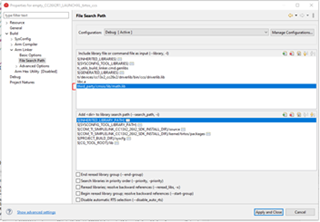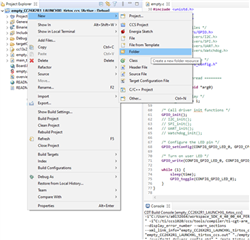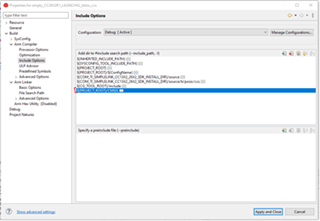Other Parts Discussed in Thread: CC1312R, CC2652R7, CC1352R, CC1352P, CC2652P, CC2652R
Hi,
Here is some guidance to leverage the DSP possibilities of the CC2642R in order to run FFT operations.
Note:The same guide is applicable to all the CC13xx and CC26xx devices having a Cortex M4F. These include among others CC1312R, CC1352R, CC1352P, CC1352R7, CC2642R, CC2652R, CC2652P, CC2652R7 etc.
- Download the CMSIS-DSP library file https://github.com/ARM-software/CMSIS_5/blob/5.7.0/CMSIS/DSP/Lib/ARM/arm_cortexM4lf_math.lib
- Store the file in <SDK>\source\third_party\cmsis\lib
- Rename the file math.lib
- Download the header files stored in https://github.com/ARM-software/CMSIS_5/tree/5.7.0/CMSIS/DSP/Include
- If needed here is the content of my <SDK>\source\third_party\cmsis folder cmsis.zip
- Store them in <SDK>\source\third_party\cmsis\include
- Open CCS, import the empty example
- Include the library: Project > Properties > Build > Arm Linker > File Search Path. Add third_party/cmsis/lib/math.lib

- In your project create a new folder named CMSIS to store the header files for the CMSIS library

- Copy the files stored in <SDK>\source\third_party\cmsis\include inside this new folder
- Add this folder to the search path: Project > Properties > Build > Arm Compiler > Include Options

I have tested this using the "empty" example available in the SDK (<SDK>\examples\rtos\<DEVICE>\drivers\empty) where I have added the example provided with the library.
Here is the modified content of my empty.c file:
/*
* Copyright (c) 2015-2019, Texas Instruments Incorporated
* All rights reserved.
*
* Redistribution and use in source and binary forms, with or without
* modification, are permitted provided that the following conditions
* are met:
*
* * Redistributions of source code must retain the above copyright
* notice, this list of conditions and the following disclaimer.
*
* * Redistributions in binary form must reproduce the above copyright
* notice, this list of conditions and the following disclaimer in the
* documentation and/or other materials provided with the distribution.
*
* * Neither the name of Texas Instruments Incorporated nor the names of
* its contributors may be used to endorse or promote products derived
* from this software without specific prior written permission.
*
* THIS SOFTWARE IS PROVIDED BY THE COPYRIGHT HOLDERS AND CONTRIBUTORS "AS IS"
* AND ANY EXPRESS OR IMPLIED WARRANTIES, INCLUDING, BUT NOT LIMITED TO,
* THE IMPLIED WARRANTIES OF MERCHANTABILITY AND FITNESS FOR A PARTICULAR
* PURPOSE ARE DISCLAIMED. IN NO EVENT SHALL THE COPYRIGHT OWNER OR
* CONTRIBUTORS BE LIABLE FOR ANY DIRECT, INDIRECT, INCIDENTAL, SPECIAL,
* EXEMPLARY, OR CONSEQUENTIAL DAMAGES (INCLUDING, BUT NOT LIMITED TO,
* PROCUREMENT OF SUBSTITUTE GOODS OR SERVICES; LOSS OF USE, DATA, OR PROFITS;
* OR BUSINESS INTERRUPTION) HOWEVER CAUSED AND ON ANY THEORY OF LIABILITY,
* WHETHER IN CONTRACT, STRICT LIABILITY, OR TORT (INCLUDING NEGLIGENCE OR
* OTHERWISE) ARISING IN ANY WAY OUT OF THE USE OF THIS SOFTWARE,
* EVEN IF ADVISED OF THE POSSIBILITY OF SUCH DAMAGE.
*/
/*
* ======== empty.c ========
*/
/* For usleep() */
#include <unistd.h>
#include <stdint.h>
#include <stddef.h>
/* Driver Header files */
#include <ti/drivers/GPIO.h>
// #include <ti/drivers/I2C.h>
// #include <ti/drivers/SPI.h>
// #include <ti/drivers/UART.h>
// #include <ti/drivers/Watchdog.h>
/* Driver configuration */
#include "ti_drivers_config.h"
#include "arm_math.h"
#include "arm_const_structs.h"
#define TEST_LENGTH_SAMPLES 4096
/* -------------------------------------------------------------------
* This is a fix for undefined __hardfp_sqrtf and __hardfp_sqrt symbols
* ------------------------------------------------------------------- */
int __hardfp_sqrt(int f){ return sqrt(f); }
float32_t __hardfp_sqrtf(float32_t f){ return sqrt(f); }
/* -------------------------------------------------------------------
* External Input and Output buffer Declarations for FFT Bin Example
* ------------------------------------------------------------------- */
extern float32_t testInput_f32_10khz[TEST_LENGTH_SAMPLES];
static float32_t testOutput[TEST_LENGTH_SAMPLES/2];
/* ------------------------------------------------------------------
* Global variables for FFT Bin Example
* ------------------------------------------------------------------- */
uint32_t fftSize = 2048;
uint32_t ifftFlag = 0;
uint32_t doBitReverse = 1;
arm_cfft_instance_f32 varInstCfftF32;
/* Reference index at which max energy of bin occurs */
uint32_t refIndex = 213, testIndex = 0;
/* ----------------------------------------------------------------------
* Max magnitude FFT Bin test
* ------------------------------------------------------------------- */
void MaxMagnitudeFFTBinTest(void)
{
arm_status status;
float32_t maxValue;
status = ARM_MATH_SUCCESS;
status=arm_cfft_init_f32(&varInstCfftF32,fftSize);
/* Process the data through the CFFT/CIFFT module */
GPIO_write(CONFIG_GPIO_LED_0, CONFIG_GPIO_LED_ON);
GPIO_write(CONFIG_GPIO_LED_1, CONFIG_GPIO_LED_OFF);
arm_cfft_f32(&varInstCfftF32, testInput_f32_10khz, ifftFlag, doBitReverse); // 2.587ms for 1024 points | 5.820ms for 2048 (280'411 clock cycles)
GPIO_write(CONFIG_GPIO_LED_0, CONFIG_GPIO_LED_OFF);
GPIO_write(CONFIG_GPIO_LED_1, CONFIG_GPIO_LED_ON);
/* Process the data through the Complex Magnitude Module for
calculating the magnitude at each bin */
GPIO_write(CONFIG_GPIO_LED_0, CONFIG_GPIO_LED_ON);
GPIO_write(CONFIG_GPIO_LED_1, CONFIG_GPIO_LED_OFF);
arm_cmplx_mag_f32(testInput_f32_10khz, testOutput, fftSize); //22.020ms for 1024 points | 44.01 ms for 2048 points (2'128'459 clock cycles)
GPIO_write(CONFIG_GPIO_LED_0, CONFIG_GPIO_LED_OFF);
GPIO_write(CONFIG_GPIO_LED_1, CONFIG_GPIO_LED_ON);
/* Calculates maxValue and returns corresponding BIN value */
arm_max_f32(testOutput, fftSize, &maxValue, &testIndex);
status = (testIndex != refIndex) ? ARM_MATH_TEST_FAILURE : ARM_MATH_SUCCESS;
if (status != ARM_MATH_SUCCESS)
{
while (1); // something went wrong
}
else
{
// everything is working
}
}
/*
* ======== mainThread ========
*/
void *mainThread(void *arg0)
{
/* Call driver init functions */
GPIO_init();
// I2C_init();
// SPI_init();
// UART_init();
// Watchdog_init();
/* Configure the LED pin */
GPIO_setConfig(CONFIG_GPIO_LED_0, GPIO_CFG_OUT_STD | GPIO_CFG_OUT_LOW);
GPIO_setConfig(CONFIG_GPIO_LED_1, GPIO_CFG_OUT_STD | GPIO_CFG_OUT_LOW);
/* Turn on user LED */
MaxMagnitudeFFTBinTest(); // 24.77ms
while (1) {
}
}
You may also want to review this post, this thread and this app note for additional details.
Best regards,

